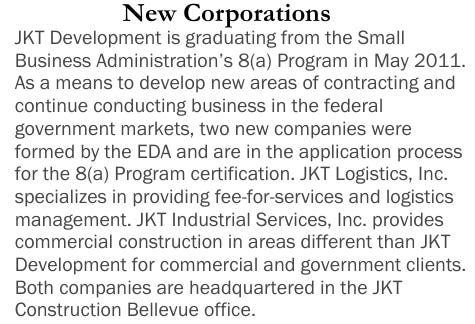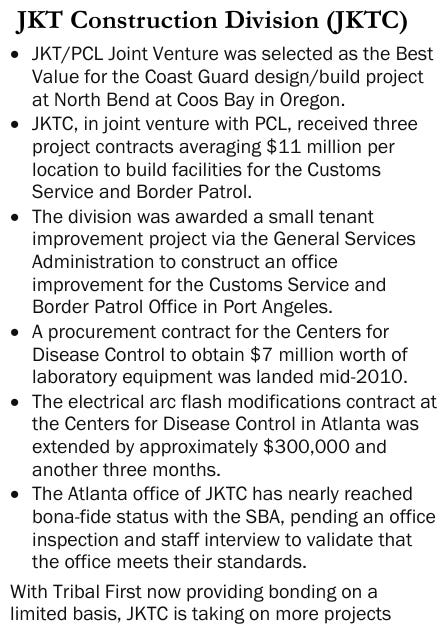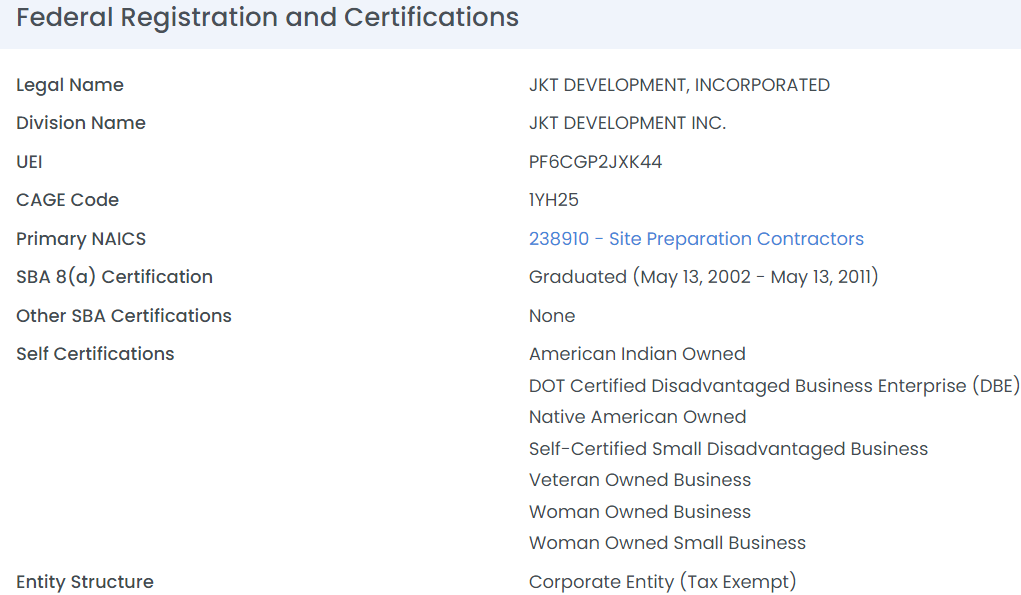Digging deep into Jamestown Excavating
The impressive success of a disadvantaged company
County pauses grant award to Habitat for Humanity. Leaders are selective about “equity” concerns. Local company goes national. How to stop being so poor. A lesson from 2024.
Within minutes of Commissioner Randy Johnson swearing to serve a 3rd four-year term “faithfully and impartially,” an $800,000 tax-funded grant to Habitat for Humanity of Clallam County hit a snag.
“The prosecuting attorney’s office received, yesterday afternoon, a question regarding some of the issues that were raised in the hearing and testimony today,” began Dee Boughton, the County’s chief civil deputy prosecuting attorney. “Specifically, whether or not public works bidding requirements would apply, I think in particular, to the application made by Habitat for Humanity.”
Boughton said that questions have arisen regarding contracts Habitat for Humanity has entered into — specifically, the decision to award an estimated $2.6 million contract to the Jamestown Tribe without soliciting bids from its competitors.
The partnership seemed like a natural fit: Habitat for Humanity wants to create affordable workforce housing, and in a Sequim Gazette article, Jamestown Tribe’s CEO Ron Allen said, “The Olympic Peninsula, like many areas in America, urgently needs to generate affordable housing opportunities to reduce the high eviction rates and increase household financial stability.”
Ironically, the Jamestown Tribe is contributing to the housing unaffordability crisis. As they convert properties into tribal trust land (258 acres in 2023), parcels are removed from property tax rolls. The burden of funding essential services is then shifted onto the rest of the community, raising their property taxes, thus increasing the cost of housing. Examples abound:
The commissioners just approved two 1% property tax increases.
The hospital doubled what it collects from property owners.
Port Angeles recently passed school bond and levy measures, and Sequim will be looking to do the same this year.
The math is undebatable: when the Tribe chooses to defund our schools, libraries, emergency responders, veterans, and those with disabilities, we all must pay more to stay in our homes.
Boughton’s initial investigation suggests that the 45-home “Lyon’s Landing” development in Carlsborg qualifies as a “public work,” and legally, bidding requirements would likely apply under Washington State law RCW 39.04. “But this needs further analysis,” he clarified.
Boughton also suggested that the no-bid contract could violate Clallam County code 5.40, which may classify the development as a public facility.
Still, the three commissioners unanimously passed a resolution awarding $800,000 from the Opportunity Fund to Habitat for Humanity, stipulating that it “must meet all legal requirements.”
In other words, the commissioners, who collectively have 19 years of commissioning experience, aren’t concerned that:
Habitat’s selection of the Jamestown Tribe for a $2.6 million contract appears to be a kickback for a recent $50,000 donation from the Tribe.
It’s another instance of Commissioner Mark Ozias funneling hundreds of thousands in taxpayer funds to his top campaign donor, the Jamestown Tribe.
It’s unfair for other businesses that must compete against the Jamestown Tribe for work.
As long as it’s legal, the commissioners support the no-bid contract with the Jamestown Tribe.
Public comment
“Opportunity Fund. I really don’t understand what you’re trying to do,” said Sequim resident Eric Fehrmann to commissioners and Opportunity Fund Board members during the public comment period. “You say you want to create opportunities for people to have housing, well it’s pretty simple: if you have jobs that pay well enough for you to be able to buy a house, you can buy a house…
“Affordable housing is really simple. If you create an opportunity for people to go out and form a business, and succeed, and pay people and employ people, they’re going to be able to afford to live. If you don’t do that, or if you put in obstacles in their way, like giving a specific company, called ‘The Tribe’ an upper hand and just give them the opportunity so they can do things for their own people, supposedly, rather than everyone, where’s the fairness in that?
“Where’s the opportunity for me, a native-born American, to go out there and start a company and compete with somebody who pays 25% less in taxes and fees? Where’s the equity in that? You guys always talk about equity, there is no equity there.”
Commissioner Ozias said after the public hearing, “I would just want to clarify, for the record that when tribal businesses conduct businesses with the private sector, they do pay the same state and local taxes as any other private sector business. They don’t have any special tax advantages regarding those construction services.”
Commissioner French also had closing comments. “When they do business off of their reservation or off of Indian Country, they do pay those taxes. So, you can look up those documents, again, directly from the State Department of Revenue, that really goes into detail explaining how this works and how it doesn’t. And again, if people don’t like the system, then the federal law needs to change — this is not something the County has any control over.”
Commissioners Ozias and French did not address the tax advantages extended to the Tribe that allow the corporation to underbid its competitors or how the County favors its “most important partner” over other small businesses.
Local company goes national
As far as small businesses go, Jamestown Excavating is excelling. According to the Department of Transportation website, its legal name is “JKT Development Inc.”
The company grew its workforce by 40% last year alone, and according to highergov.com, a website dedicated to federal bids, JKT Development has been awarded $37 million in federal contracts.
Unimpeded by the regulations constricting its competitors, Jamestown Excavating has grown tremendously since its 1996 inception and appears to have branched out to Seattle and Georgia markets.
Washington State’s Labor and Industries website says the company is registered in Blyn, and Bloomberg says it is “a Tribally-owned enterprise of the Jamestown S’Klallam Tribe.”
A search on the Georgia Corporations Division also lists it as a “Foreign Profit Corporation” with an address in Blyn. However, the Business status was “revoked” and dissolved in 2016.
JKT Development’s connections outside Clallam County can be substantiated — On LinkedIn, Michael D'Itri worked for JKT Development in Atlanta and Seattle.
The 2010 “Report to Tribal Citizens” stated that JKT Development was headquartered in Bellevue and conducting business in the federal government market.
Fourteen years ago, the company had harnessed multiple federal projects in Port Angeles, Oregon, and Atlanta.
The growth is remarkable, considering JKT Development is self-certified as disadvantaged.
A tale as old as time
Clallam County has a problem to solve — how do we quit being so poor?
One approach our community leaders widely embrace is taxing our way to prosperity. Access to arts, culture, and heritage promotes prosperity, so the commissioners are considering adding a Cultural Access Program tax. Peninsula Behavioral Health’s luxury housing complex intends to help homeless people become prosperous; that’s funded by a tax, too. Our local hospital continues to hemorrhage money but hopes to find prosperity by doubling the amount it collects through property taxes.
There’s an example of how prosperity and opportunity can be achieved here in Clallam County. When fees, regulations, and bureaucracy are removed, companies flourish. Just look at last year’s Jamestown Report to Tribal Citizens. Here are a few excerpts:
The Tribe’s land base has grown significantly over the years… 2023 was a year of consistent and stable growth… as an organization the Tribe saw its workforce grow 8.5%… 7 Cedars had steady growth… Carlsborg Self-Storage’s new offices have helped facilitate growth for JEX and the Tribe’s construction team, while awaiting the land into trust process… Jamestown Property Management (JPM) saw great success with the vacation rental on the Cedars at Dungeness golf course over the past year… Jamestown Land Survey has seen growth in both the number of jobs and scale of work in 2023… Jamestown Excavating has had another amazing year with its best year to date in total work completed… The combination of Tribal work, commercial work, civil work, and government work ensures that the Tribe is getting a great return on the huge investment it has made. Also, all the Tribal Businesses will be kept under the brand “JKT Development” growing all through 2024 and beyond.
When a single corporation dominates the market, it can create a monopoly.
Lack of competition can lead to stagnant economic growth, as there is little incentive to innovate or improve products and services.
Prices can be set without worrying about losing customers to competitors. This usually leads to higher prices for consumers, as there's no alternative available.
Without competition, the quality of goods and services can decline. Consumers may also have fewer choices.
Monopolies often create barriers that make it difficult for new companies to enter the market. This stifles entrepreneurship and can limit economic growth.
Monopolies may be inefficient in their operations since they do not face competitive pressure to cut costs and optimize processes.
Cain and Abel, Esau and Jacob — familial tales of deception and favoritism have been told throughout history. When one sibling receives preferential treatment, the other sees it as unfair and often becomes resentful. In Clallam County, the favored son is given taxpayer money and better jobs, while the disfavored son generates the money and is left to eat the crumbs.
Community engagement
Perhaps most remarkable is that Habitat for Humanity, the Economic Development Council, the Opportunity Fund Board, the Board of County Commissioners, and the County Administrator didn’t raise concerns that awarding taxpayer funds via a no-bid contract may violate state law and county code. Seemingly, a private citizen or group of people contacted the Prosecuting Attorney and encouraged the County to reexamine an unfair and possibly illegal transaction.
2024 taught us that robust community engagement may be stifled, but it is far from dead.













We tax payers in Clallam County appreciate your work. Keep after them Jeff!
The commissioners stated that the tribe is paying all of the taxes on private work. How are they paying vehicle licensing fees for heavy trucks and such on only a private job? Or do they mean only the taxes and not the rest of the costs that tribal business doesn’t pay.